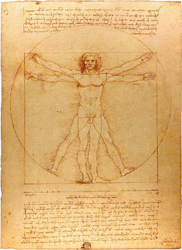
"Vitruvian Man" from the Notebooks of Leonardo da Vinci.
The video entitled "Point of View" was part of a PBS series produced by James Burke entitled The Day the Universe Changed. I have used it because it focuses on the shift between Medieval and Renaissance conceptions of the world. During the Renaissance, an ideology of "man" develops that is central to modern attitudes. Burke refers to this in the following passage from the companion book to the TV series:
| The right of each person to express his individuality is perhaps the most jealously guarded prerogrative in modern Western society. We exercise this right in various ways: in the vote, in freedom of expression and movement, and in more personal forms such as our career, home, and appearance. In each of these manifestations we express our difference one from the other, our uniqueness. Concern for privacy, and the need to ensure protection for what information may exist at large about us, is a major determinant in the way we live. We maintain the correct personal distance from each other, we regard physical assault as a major crime. We allow the state to have many rights over us, but never to invade or detract from our own rights as individuals. |
As suggested by Burke, these attitudes that we all take for granted and would be loathe to give up are not "natural" but are a product of a particular cultural tradition. The Renaissance plays a central role in the development of this modern ideology.
Medieval thought was dominated by an hierarchical conception
of the world. The super-natural, natural, social, sexual, economic, and political
worlds were all conceived of hierarchically. Identity was determined by placement
or position within these hierarchies. Ones place in Medieval society was defined
by "corporate" metaphor. 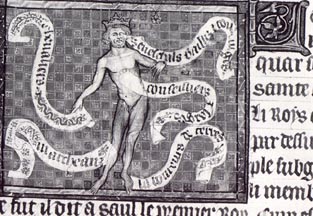 Identity
was determined by what part of the body one was identified with. This is well
illustrated by a fourteenth-century image of the Body Politic from a copy of
the Avis au roys. Here, the head with the vital functions of sight and
hearing is associated with seneschals, bailiffs, and provosts and other judges.
Knights are associated with the hands, and counsellors and wise men are associated
with the heart. While merchants and the workers of the earth are connected to
the legs. Late medieval culture would have little comprehension of our ideas
of autonomy, equality, individuality, and originality. From their point of view
these would be anti-social traits. Success as a medieval artisan depended on
the ability to conform to accepted practices. The conception of the world was
a static rather than dynamic one. Where we value change as a positive, they
would see it as a negative. The maintenance of the boundaries and the right
order of the hierarchical divisions of the world was central to the medieval
conception of the world.
Identity
was determined by what part of the body one was identified with. This is well
illustrated by a fourteenth-century image of the Body Politic from a copy of
the Avis au roys. Here, the head with the vital functions of sight and
hearing is associated with seneschals, bailiffs, and provosts and other judges.
Knights are associated with the hands, and counsellors and wise men are associated
with the heart. While merchants and the workers of the earth are connected to
the legs. Late medieval culture would have little comprehension of our ideas
of autonomy, equality, individuality, and originality. From their point of view
these would be anti-social traits. Success as a medieval artisan depended on
the ability to conform to accepted practices. The conception of the world was
a static rather than dynamic one. Where we value change as a positive, they
would see it as a negative. The maintenance of the boundaries and the right
order of the hierarchical divisions of the world was central to the medieval
conception of the world.
Any discussion of the development of the western conception of humanity with its emphasis on individuality has to take into consideration the development of Renaissance thought. The excerpts which follow are intended to exemplify Renaissance conceptions. In your reading of these statements, I would like you to try to define the similarities and dissimilarities of the attitudes expressed in these excerpts to what you understand to be characteristic of both medieval and modern conceptions.
Just as intellectuals like Pico della Mirandola, Leonardo Bruni, and Marsilio Ficino give literary form to the Renaissance conception of "man," so do artists like Donatello, Michelangelo, Albrecht Dürer, etc. give visual and physical form to this ideology. Compare for example Donatello's figure of St. George to one of the Jamb figures from the Royal Portals of Chartres Cathedral:
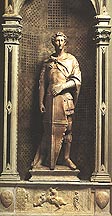
Donatello, St. George, c. 1415-17, made for armorers and sword makers guild, Orsanmichele, Florence. |
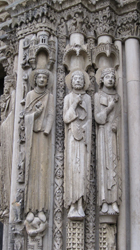
|
Michelangelo's David, completed between 1501-4, can be seen almost to be a spiritual self-portrait of the artist:
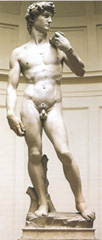

In a similar vein, Michelangelo's Creation of Adam from the Sistine Ceiling can be understood as an important statement about the nature of human creativity:
In your
journal write down what you consider to be the major differences between
these works, and how ![]() these
differences reflect a major shift in the ideological conception of "man"
from the Middle Ages to the Renaissance. In considering the David
it is important to see it in relationship to images of the male nude in
Greek Classical art. One of Michelangelo's intentions in making the David
was to rival the works of Antiquity. Compare Michelangelo's work to
the Roman copy of the Doryphoros by Polykleitos, a major mid fifth
century B.C.E. work.
these
differences reflect a major shift in the ideological conception of "man"
from the Middle Ages to the Renaissance. In considering the David
it is important to see it in relationship to images of the male nude in
Greek Classical art. One of Michelangelo's intentions in making the David
was to rival the works of Antiquity. Compare Michelangelo's work to
the Roman copy of the Doryphoros by Polykleitos, a major mid fifth
century B.C.E. work.
* You will note on this page whenever I use the word "man", I place it within quotation marks. This is intended to call attention to the use of this word. Until the Feminist movement, it seemed "natural" to refer to "man" as being synonymous with "human", but today we have become aware of the sexist implications of the use of this word. I try in my teaching to avoid its use except in cases when it is historically important to call attention to it. This is especially true of the Renaissance when much attention was paid to defining "man". When we encounter the word "man" in the Renaissance we have to acknowledge its sexist implications. The Renaissance intellectual did not mean to include women. At the end of this page you will find two excerpts that articulate the Renaissance conception of "woman." Note how it is constructed in contrast to "man" as a binary opposite.
Relate these images to the excerpts from Renaissance philosophy that follows.
Pico della Mirandola, Oration on the Dignity of Man (excerpts)
I have read in the records of the Arabians, reverend Fathers, that Abadala the Saracen, when questioned as to what on this stage of the world, as it were, could be seen most worthy of wonder, replied: "There is nothing to be seen more wonderful than man." In agreement with this opinion is the saying of Hermes Trismegistus: "A great miracle, Asclepius, is man." But when I weighed the reason for these maxims, the many grounds for the excellence of human nature reported by many men failed to satisfy me --that man is the intermediary between creatures, the intimate of the gods, the king of the lower beings, by the acuteness of his senses, by the discernment of his reason, and by the light of his intelligence the interpreter of nature, the interval between fixed eternity and fleeting time, and (as the Persian say) the bond, nay, rather, the marriage song of the world, on David's testimony but little lower than the angels. Admittedly great though these reasons be, they are not the principal grounds, that is, those which may rightfully claim for themselves the privilege of the highest admiration. For why should we not admire more the angels themselves and the blessed choirs of heaven? At last it seems to me I have come to understand why man is the most fortunate of creatures and consequently worthy of all admiration and what precisely is that rank which is his lot in the universal chain of Being --a rank to be envied not only by brutes but even by the stars and by minds beyond this world. It is a matter past faith and a wondrous one. Why should it not be? For it is on this very account that man is rightly called and judged a great miracle and a wonderful creature indeed.
But hear, Fathers, exactly what this rank is and, as friendly auditors, conformably to your kindness, do me this favor. God the Father, the supreme Architect, had already built this cosmic home we behold, the most sacred temple of His godhead, by the laws of His mysterious wisdom. The region above the heavens He had adorned with Intelligences, the heavenly spheres He had quickened with eternal souls, and the excrementary and filthy parts of the lower world He had filled with a multitude of animals of every kind. But, when the work was finished, the Craftsman kept wishing that there were someone to ponder the plan of so great a work, to love its beauty, and to wonder at its vastness. Therefore, when everything was done (as Moses and Timaeus bear witness), He finally took thought concerning the creation of man. But there was not among His archetypes that form which He could fashion a new offspring, nor was there in His treasure-houses anything which He might bestow on His new son as an inheritance, nor was there in the seats of all the world a place where the latter might sit to contemplate the universe. All was now complete; all things had been assigned to the highest, the middle, and the lowest orders. But in its final creation it was not the part of the Father's power to fail as though exhausted. It was not part of His wisdom to waver in a needful matter through poverty of counsel. It was not the part His kindly love that he who was to praise God's divine generosity in regard to others should be compelled to condemn it in regard to himself.
At last the best of artisans ordained that creature to whom He had been able to give nothing proper to himself should have joint possession of whatever had been peculiar to each of the different kinds of being. He therefore took man as a creature of indeterminate nature and, assigning him a place in the middle of the world, addressed him thus: "Neither a fixed abode nor a form that is thine alone nor any function peculiar to thyself have we given thee, Adam, to the end that according to thy longing and according to thy judgment thou mayest have and possess what abode, what form, and what functions thou thyself shalt desire. The nature of all other beings is limited and constrained within the bounds of laws prescribed by Us. Thou, constrained by no limits, in accordance with thine own free will, in whose hand We have placed thee, shalt ordain for thyself the limits of thy nature. We have set thee at the world's center that thou mayest from thence more easily observe whatever is in the world. We have made thee neither of heaven nor of earth, neither mortal nor immortal, so that with freedom of choice and with honor, as though the maker and the molder of thyself, thou mayest fashion thyself in whatever shape thou shalt prefer. Thou shalt have the power to degenerate into the lower forms of life, which are brutish. Thou shalt have the power, out of thy soul's judgement to be reborn into the higher forms, which are divine."
O supreme generosity of God the Father, O highest and most marvelous felicity of man! To him it is granted to have whatever he chooses, to be whatever he wills. Beasts as soon as they are born (so says Lucilius) bring with them from their mother's womb all they will ever possess. Spiritual beings, either from the beginning or soon thereafter, become what they are to be for ever and ever. On man when he came into life the Father conferred the seeds of all kinds and the germs of every way of life. Whatever seeds each man cultivates will grow to maturity and bear him their own fruit. If they be vegetative, he will be like a plant. If sensitive, he will become brutish. If rational, he will grow into a heavenly being. If intellectual, he will be an angel and the son of God. And if, happy in the lot of no created thing, he withdraws into the center of his own unity, his spirit, made one with God, in the solitary darkness of God, who is set above all things, shall surpass them all. Who would not admire this our chameleon? Or who could more greatly admire aught else whatever?
The following illustration comes from a text written by the sixteenth century French philosopher Charles de Bovelles. In this illustration Bovelles appears to echo Pico's ideas:
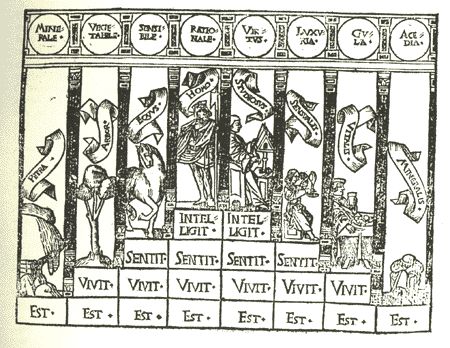
Leonardo Bruni, excerpt from Isagogue of Moral Philosophy:
Man is naturally constituted to perform a certain activity proper to himself
alone. But this activity cannot be the simple act of living, since that is shared
with the plants; nor is it sensation, since even the brute animals possess sensation.
It is, rather, life and action according to reason. Whoever uses his reason
with ability and excellence fulfills proper work for which he was naturally
constituted. To live and act well: that is the highest good of man we are seeking....
Virtue alone they considered sufficient for happiness: neither imprisonment, nor torture, nor any pain whatever, nor poverty, nor exile could stand in the way of the happy life. The wise man and the brave man (in the true sense of the word), armed with a great and unconquerable spirit, relies on himself alone and is never frightened by the mischances of humankind or the threats of fortune....
The proper activity of man can therefore only consist in rational activity.... A man can, in fact, have knowledge of an almost infinite number of things, provided he is willing to spend time studying them. He has, surely, a mind that partakes of the Divine Mind, and he is, as it were, a mortal god.
Excerpt from Marsilio Ficino, Platonic Theology: We have also said that man strives to rule over himself and all other creatures, men as well as animals; and that he is unable to bear any kind of slavery. Even if he is forced to serve, he hates his lord, since he serves against his nature. In everything he strives with all his strength to overcome others; and he is ashamed to be defeated even in small matters and the most trifling games, as if this were against the natural dignity of man.
As for our desire for victory, we can easily recognize the immeasurable splendor of our soul from the fact that even dominion over this world will not satisfy it, if after having subdued this world, it learns that there is still another which it has not yet subdued. Thus when Alexander heard Anaxarchus the follower of Democritus asserting that there are innumerable worlds, he exclaimed: How miserable am I who have not yet subdued even one world. Thus man wants neither superior, nor equal, and does not suffer that anything be excluded from his rule. This condition belongs to God only. Hence man desires the condition of God. This can be easily inferred from the fact that many philosophers and princes have sought divine honors for themselves. It did not satisfy them to be considered as good men unless they were considered also as divine. They even wanted to be worshipped like gods. Innumerable men have made the attempt; in particular, among the philosophers Empedocles, among the princes Alexander of Macedonia, are said to have had this desire. But all men have the same desire, and would make the attempt if they could but hope to succeed, as if they could as a natural right claim divinity for themselves.
Man is really the vicar of God, since he inhabits and cultivates all elements and is present on earth without being absent from the ether. He uses not only the elements, but also all the animals which belong to the elements, the animals of the earth, of the water, and of the air, for food, convenience, and pleasure, and the higher, celestial beings for knowledge and the miracles of magic. Not only doe he make use of the animals, he also rules them. It is true, with the weapons received from nature some animals may at times attack man or escape his control. But with the weapons he has invented himself man avoids the attacks of wild animals, puts them to flight, and tames them. Who has ever seen any human beings kept under the control of animals, in such a way as we see everywhere herds of both wild and domesticated animals obeying men throughout their lives? Man not only rules the animals by force, he also governs, keeps, and teaches them. Universal providence belongs to God, who is the universal cause. Hence man who provides generally for all things, both living and lifeless, is a kind of god. Certainly he is the god of the animals, for he makes use of them all, rules them all, and instructs many of them. Finally, he is the god of all materials, for he handles, changes, and shapes all of them. He who governs the body in so many and so important ways, and is the vicar of the immortal God, he is no doubt immortal.
But these arts, although they shape the material of the world, rule the animals, and thus imitate God the artisan of nature, are yet inferior to those arts which, imitating the divine rule, take care of human government. Individual animals are hardly capable of taking care of themselves or their young. Man alone abounds in such a perfection that he first rules himself, something that no animals do, and thereafter rules the family, administers the state, governs nations, and rules the whole world. As if he were born to rule, he is unable to endure any kind of slavery. Moreover, he undergoes death for the common weal, a thing which no animal does. For man despises these mortal blessings, being confident in the firmness of the common and eternal good.
Some may think that these arts pertain to the present life, and that so much care is not necessary for the present life but should be devoted to the imitation of the divine providence. Let us therefore consider those arts which are not only unnecessary for bodily life, but are most harmful to it, such as all the liberal arts, the study of which weakens the body and impedes the comfort of life: the subtle reckoning of numbers, the curious drawing of figures, the obscure movements of lines and the awe-inspiring consonance of music, the long-continued observation of the stars, the inquiry into natural causes, the investigation of things long past, the eloquence of orators and the madness of poets. In all these arts the mind of man despises the service of the body, since the mind is able at times, and can even now begin, to live without the help of the body.
One point above all should be noted, that not every man can understand how and in what manner the skilful work of a clever artisan is constructed, but only he who possesses a like artistic genius.... He who can understand it because he has a like genius could doubtless, as soon as he has understood it, also construct another, provided he did not lack the proper material. Now, since man has observed the order of the heavens, when they move, whither they proceed and with what measures, and what they produce, who could deny that man possesses as it were almost the same genius as the Author of the heavens? And who could deny that man could somehow also make the heavens, could he only obtain the instruments and the heavenly material, since even now he makes them, though of a different material, but still with a very similar order?
We have shown that our soul in all its acts is trying with all its power to attain the first gift of God, that is , the possession of all truth and all goodness. Does it also seek His second attribute? Does not the soul try to become everything just as God is everything? It does in a wonderful way; for the soul lives the life of a plant when it serves the body in feeding it; the life of an animal, when it flatters the senses; the life of a man, when it deliberates through reason on human affairs; the life of the heroes, when it investigates natural things; the life of daemons, when it speculates on mathematics; the life of the angels, when it inquires into the divine mysteries; the life of God, when its does everything for God's sake. Every man's soul experiences all these things in itself in some way, although different souls do it in different ways, and thus the human species strives to become all things by living the lives of all things. This is what Hermes Trismegistus was admiring when he said: Man is a great miracle, a living creature worthy of reverence and adoration, for he knows the genus of the daemons as if he were by nature related to them, and he transforms himself into God as if he were God himself.
Alberti, Della famiglia: Men are by nature of a more elevated mind than women. They are more suited to struggle with arms and with cunning against the misfortunes which afflict country, religion, and one's own children.... Women, on the other hand, are almost all timid by nature, soft, slow, and therefore more useful when they sit still and watch over our things. It is as though nature thus provided for our well-being, arranging for men to bring things home and for women to guard them.
Cornelius a Lapide, In omnes divi Pauli epistolas commentaria, Paris, 1638, pp. 284-5: Woman, insofar as she is a wife, is the glory of man, that is his glorious images, as I said above: because God formed woman, that is Eve, from man, and in man's likeness, so that she might represent man as a copy of him, and be as it were his image. But woman is not in the full sense of the word the image of man, if we talk of image in the sense of mind and intellect, by which woman like man is endowed with a rational soul, intellect, will, memory and freedom, and can acquire, just as man, all wisdom, grace and glory. For woman is equal to man in possessing a rational soul, and both, that is woman and man, are made in the image of God. But she is the image of man in a restrictive and analogical sense; because woman was made from man, after man, inferior to him and in his likeness. It is for this reason that St. Paul does not say explicitly 'woman is the image of man,' but rather 'woman is the glory of man'; because without doubt woman is an excellent ornament of man since she is granted to man not only to help him to procreate children, and administer the family, but also in possession and, as it were, in dominion, over which man may exercise his jurisdiction and authority. For the authority of man extends not only to inanimate things and brute beasts, but also to reasonable creatures, that is, women and wives.
Baldesar Castiglione, The Book of the Courtier, Book III, 15 (p. 217): "...I will say only that in the opinion of very wise men, as you know, man is as the form and the woman as the matter; and therefore, just as the form is more perfect than the matter-- nay, gives it its being-- so man is far more perfect than woman."